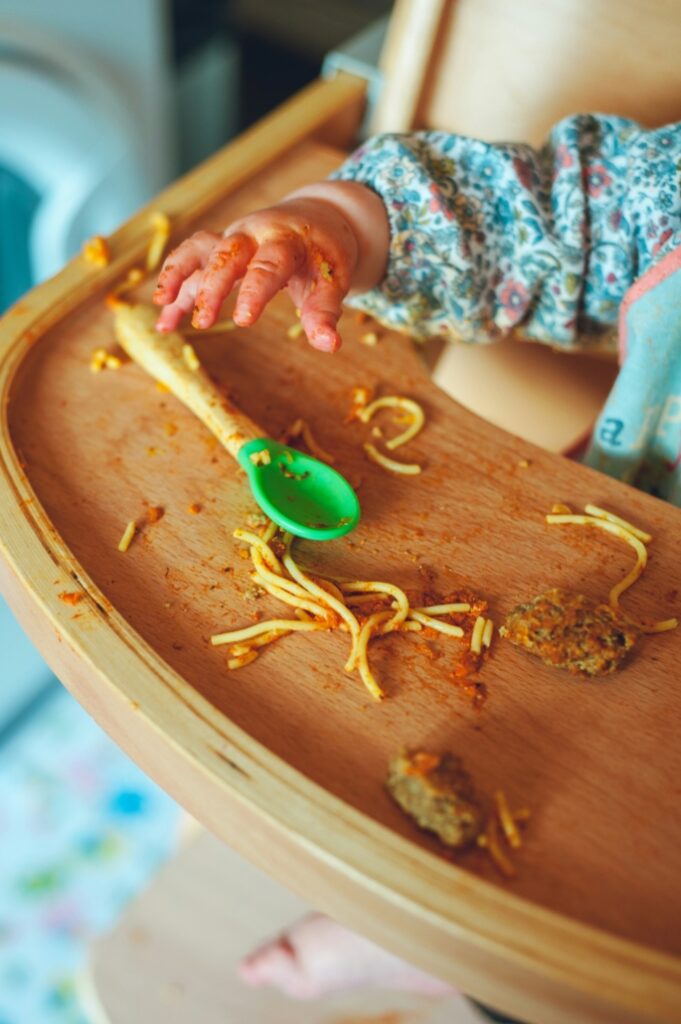By OJ Bushell
It might be surprising to some who know me that I actually do most of the cooking and meal prep for my two-year-old child. I say this, because well, just a couple of years ago, I could barely feed myself. Instead, I was in and out of treatment for anorexia.
Having lived and living experience of eating disorder recovery places me and all other parents with these struggles in a unique position to figure out how to not only feed ourselves, but also how to nourish our children without “passing our struggles” onto our kids.
Eating struggles are so commonplace in adults that the usual advice to parents with eating concerns is to take care not to “pass it on” to their kids.
Not such a hot take: It’s hard to feed kiddos when you’re in recovery from an eating disorder.
I don’t think anyone in recovery from an eating disorder wishes to pass on their struggles to their own children. While eating disorders have a high genetic component to their risk, they are biopsychosocial illnesses, and thus also carry environmental risk as well. My partner, who is not in recovery from an eating disorder or disordered eating, carried and birthed our daughter. Despite the fact that my daughter does not share any of my genetics, “passing it on” to her is still something I worry about frequently.
Our family is fat positive.
Our family actively advocates against weight stigma.
But my brain…my damn brain is still sorting things out recovery-wise.
So, how do I go about raising an anti-diet kiddo who has a well-rounded relationship with food?
Even though I’m in a solid place in recovery, I still experience guilt after eating at times. I’m so mindful of my commentary around food in front of my child because I see how observant, curious, and insightful she is already. She picks up on everything and the last thing I want is for her to pick up on my own anxieties around food.
Sometimes I reflect on what it would look like if I fed her through the lens of my eating disorder. In fact, when she first started eating solid foods, I noticed there was significant discourse in the baby led weaning community around avoiding sugar and processed foods, for example.
I found myself making muffins and baked oatmeal with diet culture-laden ingredients. And while there isn’t anything wrong with this, for me, it was a slippery slope into my eating disorder’s orthorexic tendencies. I also found myself feeling guilty if I gave her a more processed snack because it was the convenient food we had on hand at the time. What message was I sending to my child at such a young age that she needed to avoid certain foods?
I mean, when she was an infant, we followed responsive feeding and followed and responded to her cues. So why would this change merely a few months later with the introduction of solid foods?
Because I want my child to have exposure to all food and make decisions about what she wants to eat when she is older, one of the most challenging parts about feeding my child has been having to feed her food that I feared the most. No, don’t worry, this food is not inherently bad – I would never say that any food is so bad you can’t eat it, unless it’s poisoned or spoiled.
Admittedly, I have found myself hypervigilant about what my child eats and subsequently, have wanted to control my child’s food intake at times – both in terms of quantity and food type, not because I gain any sort of gratification from doing so, but because managing anxiety and uncertainty with food is what I’m used to. Watching her eat straight from a Costco size bag of snacks brings me both the greatest joy and intimidation. I have spent years unlearning that food is not equated with possible danger, but when it comes to my child, whom I love so deeply, there’s still a piece of me that ticks – well, could there be danger in that food? For me, any desire to restrict my child’s eating has been born out of the deep desire to love, protect, and care for. It’s in recognizing, though, that those things come with raising a child who can eat responsively and autonomously.
One thing I’m learning through this whole parenting alongside recovery thing, is that, friends, you just don’t have to do things perfectly. It’s such a ubiquitous bordering cliché message, but one that rings so true with parenting. There’s a lot of pressure on parents when it comes to feeding their littles. This starts even in the womb to be honest. As I mentioned above, while baby led weaning worked for us, there was pressure to prepare elaborate, homemade, perfectly balanced meals every day. And let’s be honest, while I’m primarily responsible for packing day care lunches, mine are NOT Instagram-worthy.
I’ve struggled with my overall self-worth as a parent both in terms of my recovery status and in the thoughts I’ve had around feeding my child. Because really, is there anything more important than the need and desire to feed your child well?
But through the past almost two years, this battle for self-worth has softened a bit too. By helping myself learn to feed my child and accept where she is at, I’ve also in turn, helped myself. I wouldn’t want my child’s body to be any different – her tummy that she shows off willingly, her thighs that power her little waddle. This acceptance helps me accept my own body – the parts of me that I once disapproved of – and the right to feed myself. For, there’s no greater joy than watching my toddler’s joy of being in her own body.

